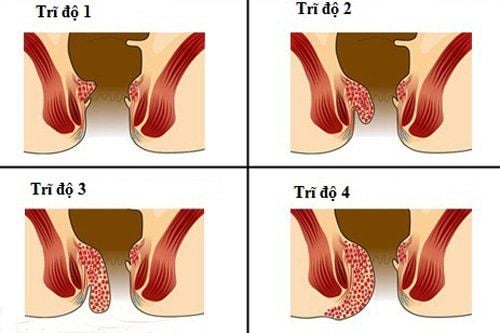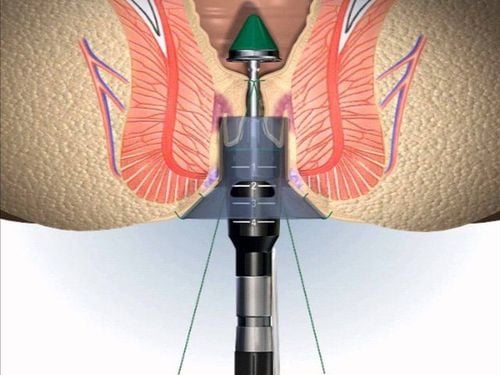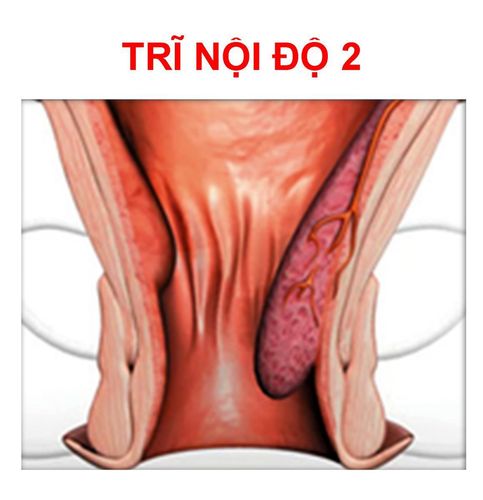Grade 3 internal hemorrhoids represent a stage of the condition with many severe symptoms, often causing discomfort and significantly affecting the patient's quality of life. However, the treatment for grade 3 internal hemorrhoids requires careful consideration: whether surgery is necessary or if treatment with medication is sufficient. Follow the article below to understand the factors to consider when deciding on treatment.
The article is professionally reviewed by Master, Doctor Nguyễn Ngọc Thắng, Department of General Surgery, Vinmec International Hospital, Da Nang.
1. What are internal hemorrhoids?
Internal hemorrhoids are a condition that develops in the submucosal space, originating from hemorrhoidal veins located inside the anus. The causes are often linked to unhealthy lifestyle habits, irritable bowel syndrome, pregnancy, and more.
Internal hemorrhoid grading:
- Grade 1: At this stage, the disease is just beginning, and symptoms are not yet obvious. Patients often experience prolonged constipation accompanied by a burning and itchy sensation during bowel movements. Bleeding may occur but is minimal, usually just a small amount on toilet paper. Hemorrhoidal lumps may form but are difficult to observe with the naked eye as they remain inside the anal canal.
- Grade 2: The condition worsens, with increased bleeding and burning, itching sensations in the anus. Hemorrhoidal lumps begin to prolapse during bowel movements, appearing as small lumps, but they usually retract on their own afterward.
- Grade 3: Bleeding increases significantly at this stage. Due to the development of hemorrhoidal lumps, patients frequently feel pain and have difficulty sitting, even when not having a bowel movement. The hemorrhoidal lumps become so large that they cannot retract on their own, but the patient can manually push them back inside.
- Grade 4: At this stage, the hemorrhoidal lumps are excessively large, prolapsing outside the anus even without bowel movements and cannot be pushed back inside. Patients experience constant pain and may bleed at any time. In addition to hemorrhoids, patients face other risks such as hemorrhoid infection, necrosis of the hemorrhoids, anal fissures, anal abscesses, and even rectal cancer.

2. Is Surgery Necessary for Grade 3 Internal Hemorrhoids?
Grade 3 internal hemorrhoids often tend to prolapse outside and do not retract on their own, which can easily lead to anal obstruction, causing damage to surrounding tissues, especially during bowel movements. Depending on the individual case and the progression of the disease, doctors may recommend either medical treatment or surgical methods to minimize complications.
Grade 3 internal hemorrhoids have a high risk of complications, such as infection, swelling, and even anal infections or significant blood loss. Therefore, treating grade 3 internal hemorrhoids becomes urgent, requiring patients to strictly follow medical advice. Hemorrhoidectomy (surgical removal of hemorrhoids) is necessary if the patient experiences symptoms such as strangulated hemorrhoids, anal bleeding, or severe infection.
Patients may opt for either medical or surgical treatment for grade 3 internal hemorrhoids. However, each method has its advantages and disadvantages, so patients need to carefully weigh their options before deciding on a treatment approach.
Grade 3 hemorrhoids represent a severe stage of the condition. If not treated properly, they can cause many dangerous complications. If medication fails to produce results, surgery will be recommended for the patient.
Thus, surgery is not entirely mandatory at this stage, but if medication proves ineffective, the patient needs to undergo surgery. The decision on whether to perform surgery must be based on the examination and conclusion of a specialist doctor. Patients should not self-administer any other treatment methods, as this can worsen the condition’s symptoms. Whether using medical or surgical treatment, each method has its own advantages and disadvantages, as detailed below:
2.1. Hemorrhoid surgery method
- Advantages: Provides quick treatment results. Patients can be discharged and recover within about a week after surgery.
- Disadvantages: However, hemorrhoidectomy also has drawbacks, including high and costly surgical expenses. Patients need time for rest and wound recovery. Surgery can damage the anus, leading to complications such as infection or anal narrowing. Additionally, hemorrhoids have a high risk of recurrence if not properly cared for.
2.2. Medical treatment
- Advantages: Low cost, economical, and safe during treatment, with the ability to completely treat hemorrhoids.
- Disadvantages: However, this method also has drawbacks, such as long treatment times, slow effectiveness, and the risk of side effects if medication is overused.
Surgery is applied in cases unresponsive to medical treatment or when hemorrhoids show life-threatening complications. Patients should visit the nearest medical facility for examination and a suitable treatment recommendation.
The choice of surgical method is also crucial. Severe cases of hemorrhoids require optimal approaches to achieve the highest effectiveness. Patients should not worry excessively, as there are now many modern surgical methods that are less painful, cause less bleeding, and have faster recovery times.
3. Surgical methods for grade 3 internal hemorrhoids
- Laser burning: This method uses a laser beam to target hemorrhoids through a CO₂-containing lens, cutting the hemorrhoid without a surgical blade. Due to the high heat, this method also vaporizes the water-containing parts of the hemorrhoid.
- Sclerotherapy of hemorrhoids: The principle of this method involves the doctor injecting a specific chemical into the hemorrhoid to induce sclerosis inside. This blocks blood flow to the hemorrhoid, causing it to shrink over time.
- Longo procedure: A modern treatment method in which the doctor uses a circular stapler to excise a ring of rectal mucosa directly above the dentate line. This reduces blood flow to the hemorrhoid, allowing it to shrink easily.
- HCPT procedure: This method is highly regarded for its precision and rapid recovery. The doctor uses high-frequency waves to coagulate cells and create blood vessel ligatures. Finally, an electric scalpel is used to cut the hemorrhoid within the anal canal.

Surgical treatment of hemorrhoids has been available for a long time and is considered the most definitive treatment method. To date, despite technical advancements, surgery remains divided into two main groups: individual hemorrhoid removal and full mucosal excision. In 1998, Antonio Longo introduced a new hemorrhoid treatment technique, which involves removing a submucosal ring of rectal mucosa approximately 3 cm above the dentate line. This technique aims to reposition the prolapsed hemorrhoid and rectal mucosa while limiting blood supply to the hemorrhoids.
The Longo method is a widely adopted modern and effective treatment today. This method minimizes postoperative complications and allows patients to recover quickly.
4. Does grade 3 internal hemorrhoid surgery have complications?
In addition to the question of whether grade 3 internal hemorrhoids require surgery, patients may encounter some complications, such as:
- Bleeding at the surgical site.
- Fecal incontinence.
- Temporary or permanent anal narrowing.
- Urinary retention (common in men).
- Mucosal prolapse.
- Infection at the hemorrhoid removal site.

Grade 3 internal hemorrhoids represent a severe stage, causing significant discomfort and pain for the patient. The decision to perform surgery depends on many factors. Therefore, consulting a doctor and undergoing regular check-ups is crucial to making the most appropriate and effective treatment decision.
Please dial HOTLINE for more information or register for an appointment HERE. Download MyVinmec app to make appointments faster and to manage your bookings easily.













